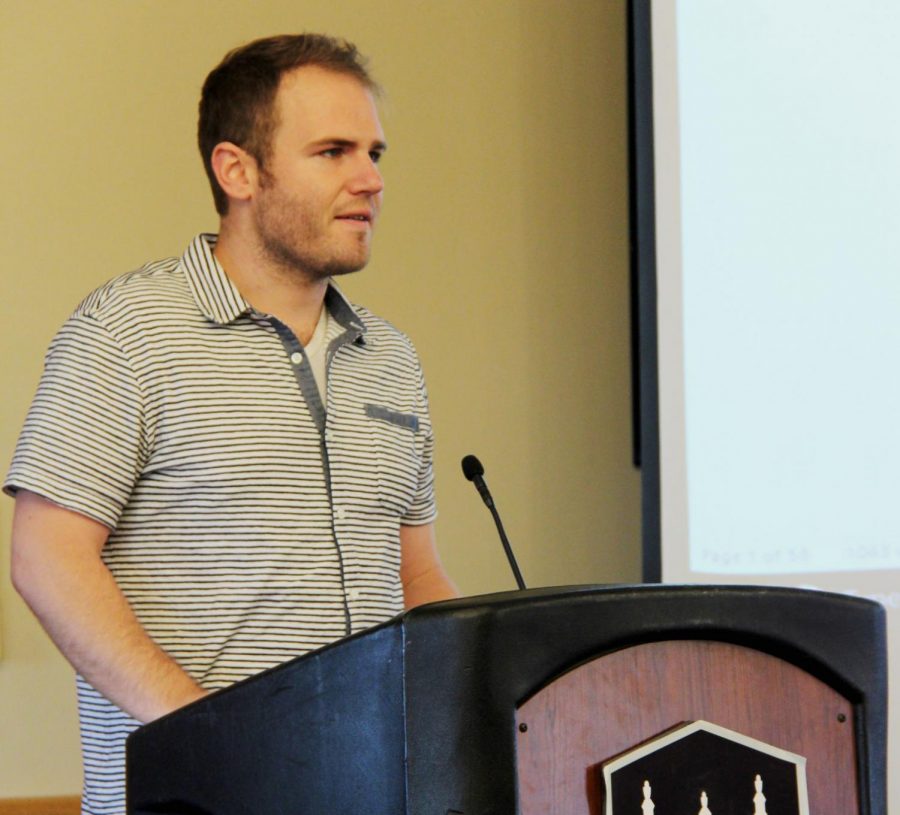Revitalization in question
Jacon Michnick, DeKalb economic development planner, spoke about student involvement within living situations throughout town at the Student Association meeting Sunday.
September 25, 2017
On Sept. 17, Jason Michnick, DeKalb economic development planner, spoke in front of the Student Association about DeKalb revitalization strategies and specifically about the student housing surplus; he wants students’ help in changing the demographics throughout a specific area, and students need to get involved with this initiative.
The University Village is a specific worry to students, the university and the surrounding community. The Village sits between campus and Hillcrest – both hugely populated by students. The affordable homes house students and families from Cook County and Rockford, according to Michnick.
Students should not have to worry about surrounding community members during their time on campus or the immediate surrounding areas that are meant to house students like near Fotis and Ridge.
The increase of families moving into student housing has resulted in making students feel unsafe, as well as an increase in crime within the area.
“A lot of the purpose-built student housing in that area is now being filled with families, and there’s a situation now where there are quite a few families living in the same area as students,” Mitchnick said, according to a Sept. 18 Northern Star article. “With that comes specific issues, public safety being the number one issue that we’re seeing, so there is an increase in crime in that area.”
Students always complain about how NIU is not safe yet the past two years, NIU has made it onto the Top 100 Safest Colleges in America by the National Council for Home Safety and Security. This statistic takes into account only property owned by NIU and the property NIU takes interest in, like fraternity and sorority houses.
DeKalb is split into three safety zones by the DeKalb Police Department which show the areas that police respond to the most. Zone one is considered the neighborhoods near Greek row, Ridge Drive, Fotis Drive and much of what stems off of W. Hillcrest Drive. In 2016, zone one accounted for 24,038 calls regarding police assistance, while only 11,247 were made from zone two, everything east of First St. and north of Lincoln Highway, and 9,142 from zone three, everything south of Lincoln Highway.
It’s no doubt that the neighborhoods near campus and running along North Annie Glidden Road are known for being unsafe; the reason why is subjective as there are different factors in everyone’s minds. There are some who may not agree with Michnick, but students need to look at the bigger picture and contemplate how NIU’s campus and reputation are affected.
Students are nervous to walk home late after coming to know the amount of crime that goes on in zone one, for example, the amount of safety bulletins students received after people from the specific area had been robbed.
“DeKalb’s residential areas are unappealing due to safety concerns, condition of housing or the type of housing available,” according to the 2015 DeKalb revitalization plan and a survey completed by 75 students. “Students are very interested in helping to make DeKalb a better city by participating in planning efforts, providing input on their needs and desires and informing fellow students about city planning efforts and opportunities to get involved.”
I’m not sure how students can help other than reaching out, paying attention and providing input whenever possible, but I do know this is a subject I have heard many people talk about. In the end, if anything, this would be a good change for the community of NIU and no longer would students be split away from campus by residential areas students do not occupy.
Of course, the declining enrollment is a factor. Not enough students means not enough student housing filled. Students can’t help with this aspect, though; the school needs to take this part into their hands and work with the students to better help everyone.







